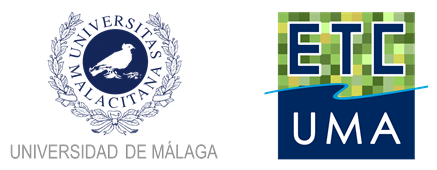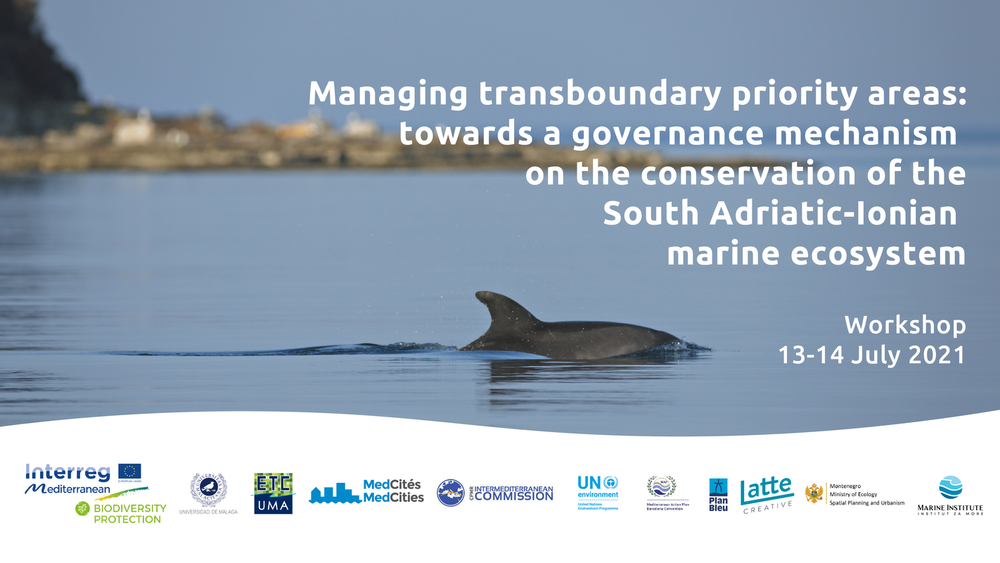The Mediterranean Biodiversity Protection Community (MBPC) project co-funded by the Interreg Med programme and led by ETC-UMA has just finalised an online workshop on ” Managing Transboundary priority areas: Towards a governance mechanism on the conservation of the South-Adriatic marine ecosystem” in collaboration with the Marine Institute in Croatia. For two days, Albania, Croatia, Italy, Montenegro and Slovenia representatives together with key regional stakeholders have met to agree on the best way forward to build on the recommendations arising from the 2019 meeting held in Herceg Novi “Managing Transboundary Impacts In Priority Areas: Towards an Action Plan for Ecosystem – based Management (EBM) in the Southern Adriatic Sea Ecoregion”.
The role of ETC-UMA has been key in the identification of the process and methodology to build a bridge between science and policy in this South Adriatic Ionian Straight Ecologically and Biologically Significant Area (SAIS EBSA) by means of creating an informal technical consultation platform involving international and regional governance and advisory bodies such as the Regional centres of the Barcelona Convention, the Mediterranean Advisory Council (MEDAC) and the International Maritime Organization (IMO) which, together with research institutions and civil society organizations active in sustainable development and conservation in the Mediterranean, have also considered potential funding perspectives to help finance this pilot experience in the region.
As part of its contribution, David Rodriguez, Senior Researcher at ETC-UMA presented the methodology and an overview of the results of a consultation multilingual survey among the countries involved, aiming to provide a multi-sectoral, averaged view of perceived biodiversity priorities, human pressures, and trends in the region by different types of actors ranging from ministerial organizations to NGOs active in conservation issues. This initial assessment will, as next step, be complemented by an analysis of the results to contrast biodiversity protection priorities identified and current policy priorities to assist in the identification of concrete measures to propose and implement in the future to involve particularly highly mobile marine species like cetaceans, and key drivers of pressures including maritime transport and fishery in the area.
To provide the basis for debate, the experience of the Pelagos Sanctuary between France, Monaco and Italy and the Wadden Sea accord involving Denmark, Germany and the Netherlands were discussed, including the commitment of MedCities as a network of municipalities and CPMR as an association of regions as facilitators of the process and instrumental in raising awareness on the need for an ecosystem based approach to management that integrates conservation goals. These regional experiences were complemented by an overview of the current status of Marine Spatial Plans by the countries involved by Andrea Barbanti, CNR-ISMAR and MSP focal point for Italy, which address not only spatial zoning but an ecosystem based approach to ensure ecological connectivity.
Dania Abdul Malak, Director of ETC-UMA, agreed during the workshop with participants on the relevance, timeliness and opportunity to build on the synergies already started in 2018, existing collaborative mechanisms and the current political agenda including the EU Green Deal, the SAP BIO programme, the EUSAIR blue corridors initiative, the Global Biodiversity Targets by the Convention on Biological Diversity and the coming COP22 meeting of the Barcelona Convention. Indeed, the new Interreg Med Programme offered an opportunity for this initiative and community to act as a bridge towards its new programming period in partnership with public authorities, networks and key regional strategies, including the funding potentially available for the work after 2022.
An early draft framework identifying concrete and achievable activities, key enablers and most favourable connections with existing regional governance initiatives will be developed based on the participants’ contributions and open for new consultations at the end of September 2021. Moreover, this pilot initiative to develop a transferable governance model for this transboundary marine area encompassing territorial waters, areas beyond national jurisdiction and Fisheries Restricted Areas among other protection figures will seek the endorsement of the countries involved for the set up of a regional UNEP MAP support system that could be applied in other EBSAs, particularly the two additional EBSAs in the Adriatic. With this objective, bilateral meetings with the institutions involved will be held in preparation for the side-event proposed to be held next December in Turkey during the COP.
- Access the presentation of ETC-UMA survey results
- Access the presentation of ETC-UMA’s role in the Mediterranean Biodiversity Protection Community – focus on Working group 1 and transboundary governance
- Access the presentation on key steps and action framework for a SAIS-EBSA action plan
- Access the concluding remarks by ETC-UMA Director
For more information, contact David Rodríguez and Dania Abdul Malak.



